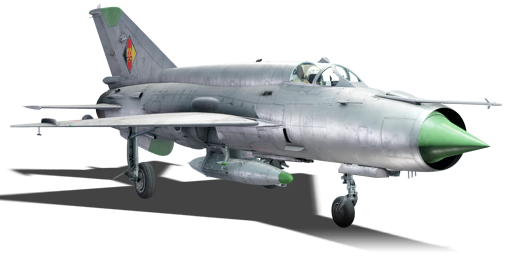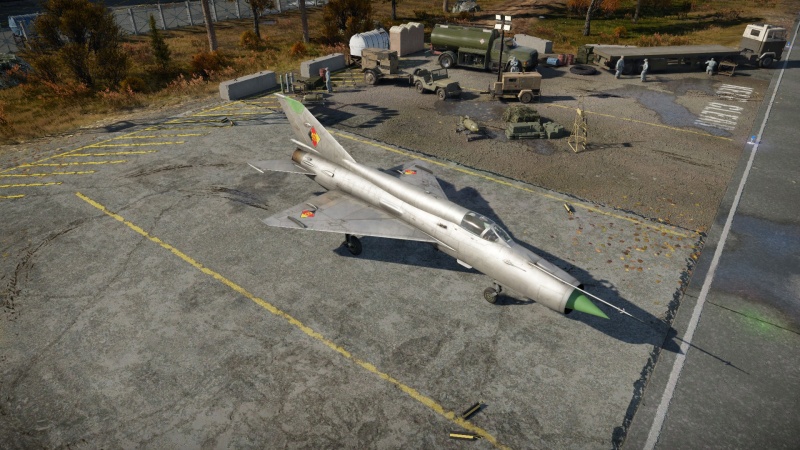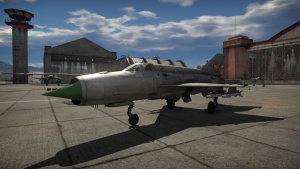MiG-21MF (Germany)
| This page is about the German jet fighter MiG-21MF (Germany). For other versions, see MiG-21 (Family). |
Contents
Description
The ◊MiG-21MF is a rank VII German jet fighter with a battle rating of 10.3 (AB) and 10.7 (RB/SB). It was introduced in Update 1.95 "Northern Wind". It is a single-engine delta-wing supersonic interceptor with conventional tail and fully-moving elevators. As of patch 2.3 it is the only German plane able to carry air-to-air missiles better than AIM-9B/R-3, only plane with balistic computer and only plane above BR 10.0.
General info
Flight performance
The ◊MiG-21MF has mediocre flight performance in every aspect among top tier jets. It will get outaccelerated by British Phantoms or MiG 21 bis, outturned by Draken or Mirage, and outspeeded by 2nd gen US Phantoms (F-4E/EJ) or MiG 21 bis. The delta wing provides great AoA while turning but it also mean the plane looses huge amount of speed doing so. This means that staying behind enemy in 1v1 is fairly simple, but when there are multiple bandits one might loose all his speed and become an easy missile target if he turns too much.
| Characteristics | Max Speed (km/h at 13,000 m) |
Max altitude (metres) |
Turn time (seconds) |
Rate of climb (metres/second) |
Take-off run (metres) | |||
|---|---|---|---|---|---|---|---|---|
| AB | RB | AB | RB | AB | RB | |||
| Stock | 2,196 | 2,178 | 16000 | 34.0 | 35.1 | 139.6 | 131.0 | 750 |
| Upgraded | 2,295 | 2,240 | 32.3 | 33.0 | 192.8 | 165.0 | ||
Details
| Features | |||||
|---|---|---|---|---|---|
| Combat flaps | Take-off flaps | Landing flaps | Air brakes | Arrestor gear | Drogue chute |
| X | ✓ | ✓ | ✓ | X | ✓ |
| Limits | ||||||
|---|---|---|---|---|---|---|
| Wings (km/h) | Gear (km/h) | Flaps (km/h) | Max Static G | |||
| Combat | Take-off | Landing | + | - | ||
| 1365 | 700 | N/A | 550 | 450 | ~11 | ~6 |
| Optimal velocities (km/h) | |||
|---|---|---|---|
| Ailerons | Rudder | Elevators | Radiator |
| < 650 | < 600 | < 850 | N/A |
Engine performance
| Engine | Aircraft mass | |||||
|---|---|---|---|---|---|---|
| Engine name | Number | Empty mass | Wing loading (full fuel) | |||
| Tumansky R-13-300 | 1 | 5,860 kg | 355 kg/m2 | |||
| Engine characteristics | Mass with fuel (no weapons load) | Max Takeoff Weight | ||||
| Weight (each) | Type | 8m fuel | 20m fuel | 29m fuel | ||
| 1,135 kg | Afterburning axial-flow turbojet | 6,505 kg | 7,455 kg | 8,168 kg | 9,900 kg | |
| Maximum engine thrust @ 0 m (RB / SB) | Thrust to weight ratio @ 0 m (WEP) | |||||
| Condition | 100% | WEP | 8m fuel | 20m fuel | 29m fuel | MTOW |
| Stationary | 3,825 kgf | 6,483 kgf | 1.00 | 0.87 | 0.79 | 0.65 |
| Optimal | 3,825 kgf (0 kph) |
6,977 kgf (1,200 kph) |
1.07 | 0.94 | 0.85 | 0.70 |
Survivability and armour
The MiG-21MF lacks armor plating. It also has 1 engine unlike some other planes. This means that the survivability is very low, even among jets. Getting hit is something that should be avoided at all cost, because should the plane survive it, even small wing damage will force the pilot to return to base.
Modifications and economy
Your main priority is to get to the R-60s as soon as possible, this will require you to unlock two tier three modifications. Unless you particularly want to research the ground attack ordinance you will be wanting to unlock "Wings repair" and "New 23 mm cannons". Therefore if you want to reach the R-60s in the shortest time possible you should research "New 23 mm cannons" as your first modification. This will then unlock tier two modifications where you can research "R-3S" and your choice of "New boosters" or "Airframe"; it is up to you in which order you unlock these, it may be appealing to unlock missiles first to help with the grind but you should keep in mind that the R-3S missiles are nearly useless (they are slightly worse than the AIM-9B and can only be fired when pulling less than 2G, which means they cannot be fired in even a gentle turn or climb). Once tier three modifications are amiable unlock "Wings repair" and "New 23 mm cannons" in whichever order you want, then go for the R-60s. Once the R-60s are unlocked you can unlock the remaining modifications in whatever order you see fit, however it is reccomened to go for G-suit and engine upgrades first.
Armaments
Offensive armament
The MiG-21MF (Germany) is armed with:
- 1 x 23 mm GSh-23L cannon, belly-mounted (200 rpg)
Suspended armament
The MiG-21MF (Germany) can be outfitted with the following ordnance:
- Without load
- 64 x S-5K rockets
- 96 x S-5K rockets
- 4 x S-24 rockets
- 4 x R-3S missiles
- 4 x R-60 missiles
- 64 x S-5K rockets + 2 x R-3S missiles
- 64 x S-5K rockets + 2 x R-60 missiles
- 2 x S-24 rockets + 2 x R-3S missiles
- 2 x S-24 rockets + 2 x R-60 missiles
- 4 x 250 kg OFAB-250sv bombs (1,000 kg total)
- 2 x 250 kg OFAB-250sv bombs + 2 x R-3S missiles (500 kg total)
- 2 x 250 kg OFAB-250sv bombs + 2 x R-60 missiles (500 kg total)
Ballistic computer
The ◊MiG-21MF has access to ballistic computer for guns and rockets.
Usage in battles
Combining an ability to pull high angle-of-attack turns on demand, excellent acceleration, high top speed, and powerful dog-fighting weaponry, the MiG-21MF is a potent air superiority fighter. Good manoeuvrability allows the pilot to easily establish a tailing flight path on most enemies, and from there, it is very hard for the enemy to shake the MiG-21MF off of their tail. The MiG, for its part, can then utilize its powerful R-60 missiles or 23 mm cannons to destroy the enemy with ease.
Note that when using the Mig-21MF's air-to-air missiles, it is best to fire them at around 1-2 km of range. Any less than that, and the missile might not have enough time to manoeuvre and successfully track the enemy. At ranges above 2 km, the missile may not be able to catch a fast-moving target. As for the 23 mm offensive cannons, be careful to practice trigger discipline. A high rate of fire and a low ammo count means that it is only possible to fire the cannons for a few seconds before they need to be reloaded at the airfield.
As a dogfighter, the MiG-21MF excels due to its powerful weaponry, great acceleration, and a good turn rate. It can easily turn with F-4 Phantoms, although the J35D and Mirage IIIC both turn better. Against these two planes, it is best to avoid extended turn fights. Instead, gradually bleed their speed - they both have poor manoeuvring energy retention. At high altitudes, this plane is not as responsive, due to its high wing load and the low air pressure. This makes it much harder to dodge incoming missiles, so it is especially important to keep a high speed when at high altitude.
The MiG-21MF can also easily engage ground targets. Its cannons can destroy lightly armoured vehicles, and its 4 x S-24 rockets are extremely capable at dealing with even the most advanced MBTs. What's more, this plane has access to a ballistic computer which calculates the impact point of cannon shells, rockets, and bombs, making aiming against ground targets a breeze.
Pros and cons
Pros:
- R-60 missiles have very good tracking and G-tolerance
- More agile than many high-tier jets
- Cannons with a high rate of fire
- Good ground attack loadouts
- A small profile which is harder to hit
Cons:
- Low ammunition count
- Poor energy retention in extended turning engagements
- Flaps rip easily
- Poor manoeuvrability at low speeds
History
The MiG-21MF (Germany) is a second-generation variant of the popular MiG-21 'Fishbed'. Operated by the East German Air Force (Luftstreitkräfte der Nationalen Volksarmee; LSK) between 1972 and 1990, the aircraft was an export variant of the MiG-21SM, and is highly similar to its counterpart, the MiG-21SMT. Designated the 'Fishbed-J', the aircraft formed the bulk of the LSK in the late stages of the Cold War. All German MiG-21 aircraft were retired following the German Reunification, though some survive as museum aircraft to this day.[1][2]
Design and procurement
The East German Air Force received many MiG-21 variants due to their ties with the Soviet Bloc. 76 MiG-21F-13 aircraft had been delivered to the East German Air Force in the early 1960s, and they later received 50 MiG-21PF 'Fishbed-D' planes, which were known as the MiG-21PFM in East German service.[1] This generated considerable confusion as the German MiG-21PFs had inadvertently been given the same name as the later, Soviet-made, MiG-21PFM 'Fishbed-F'.[1] However, in the early 1970s, the LSK received its first 3rd-generation MiG-21s, the MiG-21MF. This aircraft was essentially an export variant of the Soviet MiG-21SM. 50 MiG-21MFs were delivered to the LSK between 1972 and 1974.[1]
The MiG-21MF differs from the standard MiG-21SM by having a less powerful engine and simplified radar system, meaning that it accelerates slightly slower than its Soviet counterpart. It could reach a maximum speed of 2,230 km/h, and was flown by a single pilot.[2] As an interceptor, it carried a 23 mm dual-barreled cannon with 200 rounds in a ventral pack, and was also capable of fitting a variety of munitions including bombs, rockets and missiles.[1]
Service history
The MiG-21MF enjoyed a fairly uneventful service history with the LSK. The aircraft served with Jagdgeschwader (JG, fighter group) 8 and JG 9. It complemented the earlier MiG-21PFM and MiG-21F-13 aircraft in German service. Later on, it was complemented by the MiG-21bis, the final MiG-21 variant to serve with the German Air Force. At the time of the German reunification, many MiG-21s remained in German service.[1][2] As the new combined Luftwaffe had no plans to continue using the Soviet-era interceptor, all MiG-21 aircraft were retired in late 1990 following the German reunification. Many of those aircraft were reserved as museum pieces, and several survive to this day in museums across the globe.[2]
Media
- Skins
- Images
- Videos
See also
External links
References
Works Cited
- Aviata. (2020). German MiG-21. Retrieved November 23, 2020, from https://aviatia.net/german-mig-21/
- Museum, D. (2020). Mikojan-Gurewitsch MiG-21 MF. Retrieved November 23, 2020, from https://www.deutsches-museum.de/en/flugwerft/collections/jet-aircraft/mig-21/
| Mikoyan-Gurevich Design Bureau (Микоя́н и Гуре́вич Опытное конструкторское бюро) | |
|---|---|
| Fighters | MiG-3-15 · MiG-3-15 (BK) · MiG-3-34 |
| I-225 | |
| Jet fighters | MiG-9 · MiG-9 (l) |
| MiG-15 · MiG-15bis · MiG-15bis ISh | |
| MiG-17 | |
| MiG-19PT | |
| MiG-21F-13 · MiG-21PFM · MiG-21S (R-13-300) · MiG-21SMT · MiG-21bis | |
| MiG-23M · MiG-23ML · MiG-23MLD | |
| MiG-27M · MiG-27K | |
| MiG-29 · MiG-29SMT | |
| Export/Licensed | ␗MiG-9 · ␗MiG-9 (l) |
| ◊MiG-15bis · ◔MiG-15bis · J-2* | |
| MiG-17AS · ◔MiG-17PF · J-4* · Shenyang F-5* | |
| ◊MiG-19S · J-6A* | |
| ◄MiG-21 SPS-K · ◊MiG-21MF · ◔MiG-21MF · ▄MiG-21bis · ◔MiG-21bis-SAU · ◊MiG-21bis-SAU · ◊MiG-21 "Lazur-M" · ▄MiG-21 Bison · J-7II** | |
| ◊MiG-23BN · ◊MiG-23MF · ◔MiG-23MF · ◊MiG-23MLA | |
| ◔MiG-29 · ◊MiG-29 · ◄MiG-29G | |
| *Licensed and domesticated with Chinese designations. | |
| **Unlicensed, reverse-engineered and domesticated with Chinese designations. | |
| See Also | Shenyang · Chengdu |
| Germany jet aircraft | |
|---|---|
| |
Luftwaffe |
| He 162 | He 162 A-1 · He 162 A-2 |
| Me 163 | Me 163 B · Me 163 B-0 |
| Ho 229 | Ho 229 V3 |
| Ar 234 | Ar 234 B-2 · Ar 234 C-3 |
| Me 262 | Me 262 A-1a · Me 262 A-1a/Jabo · Me 262 A-1a/U1 · Me 262 A-1/U4 · Me 262 A-2a |
| Me 262 C-1a · Me 262 C-2b | |
| |
LSK |
| Fighters | ◊MiG-15bis · ◊Lim-5P · ◊MiG-19S |
| ◊MiG-21MF · ◊MiG-21bis-SAU · ◊MiG-21 "Lazur-M" | |
| ◊MiG-29 | |
| Attackers | ◊MiG-23BN · ◊MiG-23MF · ◊MiG-23MLA |
| ◊Su-22UM3K · ◊Su-22M4 | |
| ◊IL-28 | |
| |
Luftwaffe |
| F-84 | ◄F-84F |
| F-86 | ◄CL-13A Mk 5 · ◄CL-13B Mk.6 · ◄F-86K |
| F-104 | ◄F-104G |
| F-4 | ◄F-4F Early · ◄F-4F · ◄F-4F KWS LV |
| G.91 | ◄G.91 R/3 · ◄G.91 R/4 |
| Tornado | ◄Tornado IDS WTD61 · ◄Tornado IDS MFG · ◄Tornado IDS ASSTA1 |
| Other | Alpha Jet A · ◄Sea Hawk Mk.100 |
| Ex-LSK | ◄MiG-21 SPS-K · ◄MiG-29G · ◄Su-22M4 WTD61 |
| |
Swiss Air Force |
| ◌Hunter F.58 · FFA P-16 | |






